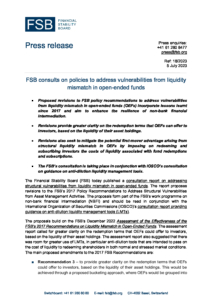Summary of document history
A key structural vulnerability from asset management activities is a potential mismatch between the liquidity of fund investments and the redemption frequency of fund units in open-ended funds.
In 2017, the FSB published policy recommendations to address structural vulnerabilities in asset management activities. The recommendations relating to liquidity mismatch (“FSB Recommendations”) aimed to:
-
strengthen regulatory reporting and public disclosure to facilitate assessment of liquidity risk in OEFs;
-
promote liquidity management both at the fund design phase and on an ongoing basis;
-
widen the availability of LMTs and use of LMTs in stressed market conditions; and
-
promote fund-level and system-wide stress testing.
IOSCO operationalised most of the FSB Recommendations through its Recommendations for Liquidity Risk Management for Collective Investment Schemes in 2018 and a set of related good practices.
In 2022, as part of its work programme to enhance the resilience of non-bank financial intermediation, the FSB assessed the effectiveness of the FSB Recommendations. This consultation report responds to the findings of the assessment report by proposing revisions to relevant parts of the FSB Recommendations.
The proposed revisions incorporate lessons learnt since 2017 and aim to enhance clarity and specificity on the intended policy outcomes to make the Recommendations more effective from a financial stability perspective.
The revised FSB Recommendations should be read in conjunction with the proposed International Organization of Securities Commissions (IOSCO) guidance on anti-dilution liquidity management tools (LMTs).
The goal of the revised FSB Recommendations, combined with the new IOSCO guidance on anti-dilution LMTs, is a significant strengthening of liquidity management by OEF managers compared to current practices.
The FSB invites comments on this consultation report, including supporting evidence where available. The FSB and IOSCO are holding a public outreach event on Wednesday 12 July from 11:00-16:00 (CEST), where they will provide an overview of the main proposals in their respective consultations and participants can provide their early feedback. Further details can be found on the right-hand side of the page.
Written responses should be sent to [email protected] by 4 September 2023 with the title “Revised OEF Recommendations”. Responses will be published on the FSB’s website unless respondents expressly request otherwise.
The final report, which will incorporate feedback from the consultation, will be published in late 2023.
Main amendments to the 2017 FSB Recommendations
Recommendation 3 – to provide greater clarity on the redemption terms that OEFs could offer to investors, based on the liquidity of their asset holdings. This would be achieved through a proposed bucketing approach, where OEFs would be grouped into different categories depending on the liquidity of their assets. OEFs in each category would be subject to specific expectations in terms of redemption terms and conditions.
Recommendation 4 – to ensure availability of a broad set of anti-dilution and quantity-based LMTs for use by OEF managers in normal and stressed market conditions.
Recommendation 5 – to achieve (i) greater inclusion of anti-dilution LMTs in OEF constitutional documents and (ii) greater use, and greater consistency in the use, of these tools in both normal and stressed market conditions. The objective is to mitigate potential first-mover advantage from structural liquidity mismatch in OEFs by imposing on investors the costs of liquidity associated with fund redemptions and subscriptions.
Recommendation 2 – to require clearer public disclosures from OEF managers on the availability and use of LMTs in normal and stressed market conditions. This aims to enhance investor awareness on the objectives and operation of anti-dilution LMTs.
